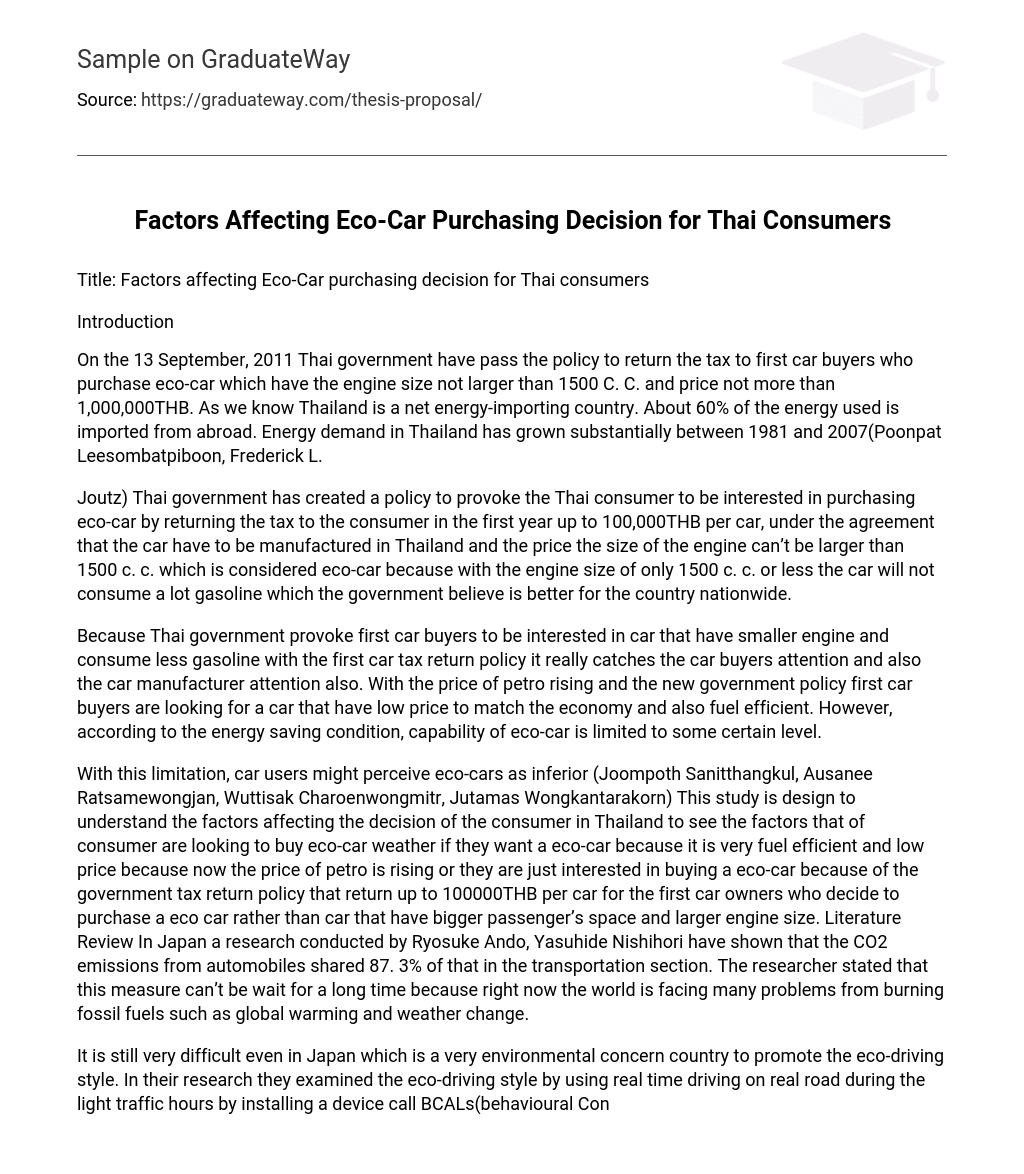Title: Factors affecting Eco-Car purchasing decision for Thai consumers
Introduction
On the 13 September, 2011 Thai government have pass the policy to return the tax to first car buyers who purchase eco-car which have the engine size not larger than 1500 C. C. and price not more than 1,000,000THB. As we know Thailand is a net energy-importing country. About 60% of the energy used is imported from abroad. Energy demand in Thailand has grown substantially between 1981 and 2007(Poonpat Leesombatpiboon, Frederick L.
Joutz) Thai government has created a policy to provoke the Thai consumer to be interested in purchasing eco-car by returning the tax to the consumer in the first year up to 100,000THB per car, under the agreement that the car have to be manufactured in Thailand and the price the size of the engine can’t be larger than 1500 c. c. which is considered eco-car because with the engine size of only 1500 c. c. or less the car will not consume a lot gasoline which the government believe is better for the country nationwide.
Because Thai government provoke first car buyers to be interested in car that have smaller engine and consume less gasoline with the first car tax return policy it really catches the car buyers attention and also the car manufacturer attention also. With the price of petro rising and the new government policy first car buyers are looking for a car that have low price to match the economy and also fuel efficient. However, according to the energy saving condition, capability of eco-car is limited to some certain level.
With this limitation, car users might perceive eco-cars as inferior (Joompoth Sanitthangkul, Ausanee Ratsamewongjan, Wuttisak Charoenwongmitr, Jutamas Wongkantarakorn) This study is design to understand the factors affecting the decision of the consumer in Thailand to see the factors that of consumer are looking to buy eco-car weather if they want a eco-car because it is very fuel efficient and low price because now the price of petro is rising or they are just interested in buying a eco-car because of the government tax return policy that return up to 100000THB per car for the first car owners who decide to purchase a eco car rather than car that have bigger passenger’s space and larger engine size. Literature Review In Japan a research conducted by Ryosuke Ando, Yasuhide Nishihori have shown that the CO2 emissions from automobiles shared 87. 3% of that in the transportation section. The researcher stated that this measure can’t be wait for a long time because right now the world is facing many problems from burning fossil fuels such as global warming and weather change.
It is still very difficult even in Japan which is a very environmental concern country to promote the eco-driving style. In their research they examined the eco-driving style by using real time driving on real road during the light traffic hours by installing a device call BCALs(behavioural Context Addressable Loggers in the shell) put on a dashboard of the car to keep logs as it catches GPS signal, we can obtain the information like position, travel speed and acceleration so that we can see if the eco-driving style is safe or not.
Many companies in Japan such as NEC for example developed a program called “Drive Manager” to collect data from more than one vehicle and providing the information on gasoline consumption. Also in Europe Ericsson(2001) have developed a analysis on which pattern factors were main factor in influencing oil use on the basis of driving patterns by calculating 19,230 driving patterns collected in real traffic and have shown that eco-driving conserve up to 5. 8%.
In Thailand a research was conducted by Jakapong Pongthanaisawan, Chumnong Sorapipatana stated that with the Thailand rapid population growth and economic development have caused increasing deman of travel and freight transport in the country. Also because of the rapid development of road infrastructure during the past three decades, Thailand heavily relies on energy-inefficient transport modes. Passengers in Thailand usually travel by private vehicles including cars, pick-up truck and motorcycle.
The inter-city transports are made by passenger cars (57%), buses (35%) and small proportion of rail and plane about 7% and 1%, respectively. Thailand is considered one of the high private vehicle ownership countries with the rate of 370vehicle per 1000 persons and due to this reason Thailand transport sector consume a high amount of energy every year so Thai government have promote the use of high energy efficiency vehicle by cutting the tax off from the purchase of eco-car buyer which increase the demand for the eco-car market rapidly since the policy has launched over 700,000 eco-car were purchase.
Methodology
This research will be mainly conduct by data collection of xxxx samples from male and female who own a eco-car or deciding to purchase a eco-car. The first section intended to collect the demographic factor such as gender, age, education; income etc and the second section will be about the opinions of eco-car owners and person who’s looking to purchase a eco-car. After the questionnaires is gathered the data will be analyzed by descriptive statistic include frequency, percentage, mean and standard deviation.
The data will be analyzed and summarized by Statistical Package for Social Science.
References
- Poonpat Leesombatpiboon, Frederick L. Joutz Sectoral demand for petroleum in Thailand
- Joompoth Sanitthangkul, Ausanee Ratsamewongjan, Wuttisak Charoenwongmitr, Jutamas Wongkantarakorn Factors Affecting Consumer Attitude toward the Use of Eco-car Vehicles
- Ryosuke Ando, Yasuhide Nishihori A Study on Factors Affecting the Effective Eco-driving
- Jakapong Pongthanaisawan, Chumnong Sorapipatana Greenhouse gas emissions from Thailand’s transport sector: Trends and mitigation options





